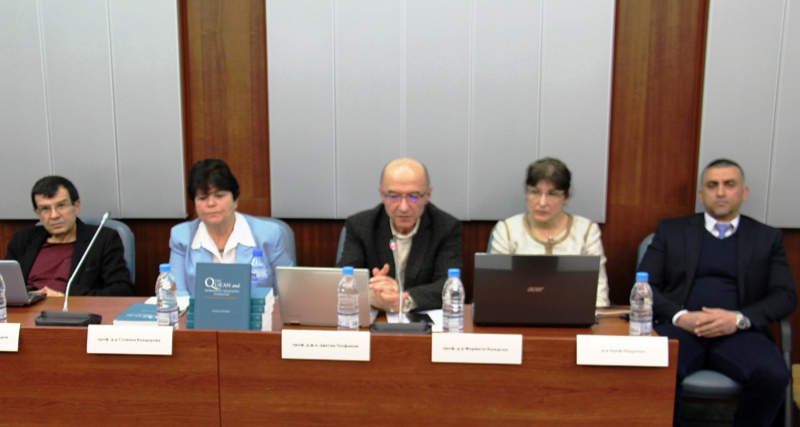News

Prof. Tsvetan Teofanov: General person reads it without going behind its interpretation
21 December 2015Prof. Tsvetan Teofanov: General person reads it without going behind its interpretation
“The book of Dr. Arif Abdullah „The Qurʼan and Normative Religious Pluralism: A Thematic Study of The Qurʼan”, contributes both for the deeper insight in the Qur’anic message and for the interfaith dialogue. It is an indisputable success for the Bulgarian Oriental studies. It is still rare when our authors publish their monographs in the West and even this fact itself is enough in order to appreciate properly the happy event which we have gathered to mark”, said Prof. PhD Tsvetan Teofanov from SU.
The doctoral monograph of Dr. Arif Abdullah, Head of the Research Center at the High Islamic Institute, was presented in the Mirror Hall of SU “St. Kliment Ohridski” at the initiative of the Faculty of Classical and Modern Philology”, Department of Arabic and Semitic Studies. The presentation was also attended by Prof. PhD Vladimir Gradev, Prof Dr. Stoyanka Kenderova and Prof. Dr. Zhorzheta Nazarska.
According to the words of Prof. Teofanov unlike other Muslim scholars who mastered traditional theology in a brilliant way but are encapsulated in it, Arif Abdullah has chosen the more difficult way – this of the analytic-polemical discourse. It suggests an answer of the big question why the positive truths about Islam in their classical formulations today look like a utopia. Even louder sound statements that the “true faith” is a hostile, warlike and aggressive religion, which behaves fanatics, xenophobes, thugs, extremists and terrorists.
The reasons and the arguments for the tragic events from the recent years and months are searched and found in the Qur’an. The general person reads it without going behind its interpretation and finds places which seem as calls for murders and massacre which when are taken out of the context bring fear and horror. This who dares to explode such fallacies risks to be declared as an apologist of Islam or at least as detached from the reality preacher.
“The great contribution of Dr. Arif Abdullah in the discussed monograph consists in this that he not only identifies complex theoretical questions with present significance, but he also gives unbiased solidly grounded answers which are based on detailed critical analysis of the sources – the Qur’an, the hadiths, tafsirs, the works of the Muslim theologians and not in a less degree – the studies of the western scholars”, further said Prof. Teofanov.
According to him Arif Abdullah considers the weaknesses of the traditional atomistic approach in the Qur’anic exegesis which is limited in the fragmentation of the text, ignoring the context, and “do not manage to recreate thematically coherent and consistent picture of the organic unity of the Qur’an”. The author interprets the global Islamic doctrine of religious pluralism which crystallizes after the complex comparative analysis of the authoritative texts on the topic.
“I think that Dr. Abdullah has undertaken above all a big risk when he took with theme and named in this way his work. He caused in our scientific field perplexity, suspicions. Dealing with religious pluralism obviously is a tradition which he takes from his teachers in Great Britain, since this is an approved research field of different sciences - philosophy, sociology, political science, law, history, and even studies of women and gender. I think that it is not useless to talk about religious pluralism and means for overcoming the discrimination, reaction against religious extremism and possibly as tools for creating of canonical and tolerant society”, said Prof. Dr. Zhorzheta Nazarska from ULSIT.
She considers that Dr. Abdullah has followed the right approach. This really is a challenge and an opportunity to show the quality of his own preparation and the strength of his conviction by discussion the religious pluralism in some from the approved models. And these approved models usually consider the religious pluralism in a political and philosophical plan. It means that under religious pluralism in general can be understood respecting the religious difference, it can be understood the increase in this religious difference.
Not least, according to Prof. Nazarska here are commented most often theorized the models of state regulation of the religious diversity mostly in the direction of restrictive regimes, linguistic, pluralistic, etc. In this sense Dr. Arif Abdullah instead of speaking about the religious pluralism and its legal, institutional, cultural and social frameworks, he undertakes research from the point of view of his own scientific field.
“One of the merits of the book is that it is well written, clear, informative profound, and engages the reader. It is seen that Dr. Abdullah is deeply concerned about this what way will follow the Muslims today. Deeply concerned about the moral responsibility which is assigned to them”, said Prof. PhD Vladislav Gradev from SU.
At the same time according to him the book is important not only for the Muslims but also for the non-Muslims not just because the political Islam is out as a whole from the world stage, but because the religion is a fundamental human reality which as the philosopher Kan sais builds the man and the culture without which neither the moral nor the political issues, the foundations themselves of the human existence can stand up.
“The book of Dr. Abdullah helps for a better extensive understanding. Indeed some important topics in Islam on the past and the present, expands our intellectual horizons, it gives a valuable contribution to the efforts to find realistic means for achieving peace and understanding”, emphasized Prof. Gradev.